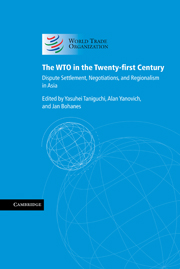Book contents
- Frontmatter
- Contents
- Notes on contributors
- Acknowledgements
- Table of dispute settlement cases and reports
- List of abbreviations
- Introduction
- PART I The WTO at Ten
- PART II Accomplishments and Future Prospects of the WTO Dispute Settlement System
- PART III Asian Perspectives on WTO Dispute Settlement
- 11 East Asia in the WTO dispute settlement mechanism
- 12 Japan's perspectives on the present Dispute Settlement Understanding negotiations
- 13 A review of some appellate decisions: law, policy, and economics in dispute settlement
- 14 Is the WTO dispute settlement mechanism important to business?
- 15 Japan's approach to the ‘use’ of the WTO: how can we achieve an effective link between business and the WTO?
- PART IV The Doha Development Agenda and Beyond
- PART V Asian Regional Integration and the Multilateral Trading System
- Index
15 - Japan's approach to the ‘use’ of the WTO: how can we achieve an effective link between business and the WTO?
from PART III - Asian Perspectives on WTO Dispute Settlement
Published online by Cambridge University Press: 05 March 2012
- Frontmatter
- Contents
- Notes on contributors
- Acknowledgements
- Table of dispute settlement cases and reports
- List of abbreviations
- Introduction
- PART I The WTO at Ten
- PART II Accomplishments and Future Prospects of the WTO Dispute Settlement System
- PART III Asian Perspectives on WTO Dispute Settlement
- 11 East Asia in the WTO dispute settlement mechanism
- 12 Japan's perspectives on the present Dispute Settlement Understanding negotiations
- 13 A review of some appellate decisions: law, policy, and economics in dispute settlement
- 14 Is the WTO dispute settlement mechanism important to business?
- 15 Japan's approach to the ‘use’ of the WTO: how can we achieve an effective link between business and the WTO?
- PART IV The Doha Development Agenda and Beyond
- PART V Asian Regional Integration and the Multilateral Trading System
- Index
Summary
Importance of focusing on the ‘use’ of the WTO
The title of this chapter refers to the ‘use’ of the World Trade Organization (WTO). The intention is to emphasize the dispute settlement aspect of the WTO, as opposed to the rule-making aspect, which has always attracted more attention. When the media writes about the WTO, it is mostly about the Doha Round. The importance of rulemaking cannot be overemphasized. But the value of the WTO would be almost nil, if it did not have the dispute settlement mechanism to cope with the problems we face today. Indeed, compared to other international organizations, the WTO stands out for the effectiveness of its enforcement mechanism.
The effectiveness of this enforcement mechanism is essential to ensure business support for the WTO. Although trade measures that can be subject to dispute settlement concern a wide variety of stakeholders, the one sector that will have the greatest incentive to ‘use’ the WTO is the business sector. This is natural if we consider that trade is part of the conduct of business. Whether small or large, business operations will be the first affected by any WTO-inconsistent measure. Therefore, an effective dispute settlement system is key to maintaining support for the WTO among business. This is why it is important to focus on the ‘use’ of the WTO and the linkage between business and the WTO as a goal in itself.
- Type
- Chapter
- Information
- The WTO in the Twenty-first CenturyDispute Settlement, Negotiations, and Regionalism in Asia, pp. 303 - 316Publisher: Cambridge University PressPrint publication year: 2007

